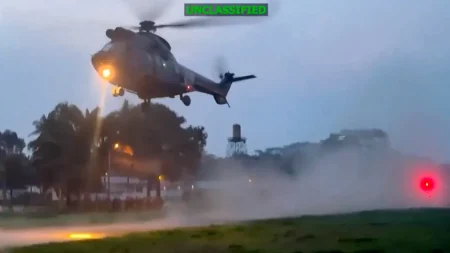Operation Intercepted: Maritime Drug Smuggling Attempt Thwarted
According to a presidential statement, authorities have intercepted a vessel attempting to smuggle illegal narcotics to the United States. The ship was navigating through international waters when it was detected and subsequently seized as part of ongoing efforts to combat drug trafficking. While details about the specific narcotics involved, the quantity seized, or the crew’s nationality remain undisclosed, the presidential announcement highlights the continuing challenges faced by law enforcement agencies in controlling maritime drug smuggling routes.
This interdiction represents just one example of the complex cat-and-mouse game played between drug cartels and international law enforcement. Drug trafficking organizations have increasingly turned to maritime routes as land borders become more heavily monitored. These criminal networks often use commercial fishing vessels, fast boats, or even semi-submersible crafts specifically designed to evade radar detection. The economic incentives remain powerful – a single successful smuggling operation can yield millions in profits, motivating traffickers to employ increasingly sophisticated methods despite the risks of capture.
The presidential announcement comes amid growing concerns about the devastating impact of illegal drugs in communities across the United States. The opioid crisis alone has claimed hundreds of thousands of American lives over the past two decades, with synthetic drugs like fentanyl dramatically increasing overdose fatalities in recent years. These narcotics typically begin their journey in production facilities overseas before being transported through complex international supply chains, making interdiction efforts at sea a critical component of the broader strategy to reduce drug availability domestically.
Maritime drug interdiction requires extensive international cooperation, sophisticated intelligence gathering, and significant resources. Coast Guard vessels, naval assets, aircraft surveillance, and coordination between multiple countries’ law enforcement agencies all play crucial roles in detecting suspicious vessels. Once identified, boarding teams face potentially dangerous situations when confronting crews who may be armed or desperate to dispose of evidence. The presidential statement likely represents the successful culmination of weeks or months of intelligence work and operational planning across multiple agencies.
The seizure occurs against a backdrop of evolving diplomatic discussions about responsibility sharing in the fight against transnational drug trafficking. Source countries, transit nations, and destination markets like the United States continue to debate the most effective approaches to disrupting the drug supply chain. While interdiction remains important, many experts emphasize that addressing root causes – including poverty in producing regions, corruption that facilitates trafficking, and addiction treatment in consumer countries – must complement enforcement efforts for meaningful progress against the global drug trade.
As investigations into this particular smuggling attempt continue, authorities will work to identify the broader network involved, potentially leading to additional arrests and seizures. The presidential announcement likely aims to demonstrate commitment to drug enforcement while signaling to trafficking organizations that maritime routes remain risky. However, history suggests that as long as demand for illegal drugs persists and potential profits remain high, criminal networks will continue adapting their methods. The interdiction represents an important tactical victory in what remains a complex, long-term challenge requiring multifaceted domestic and international responses.






